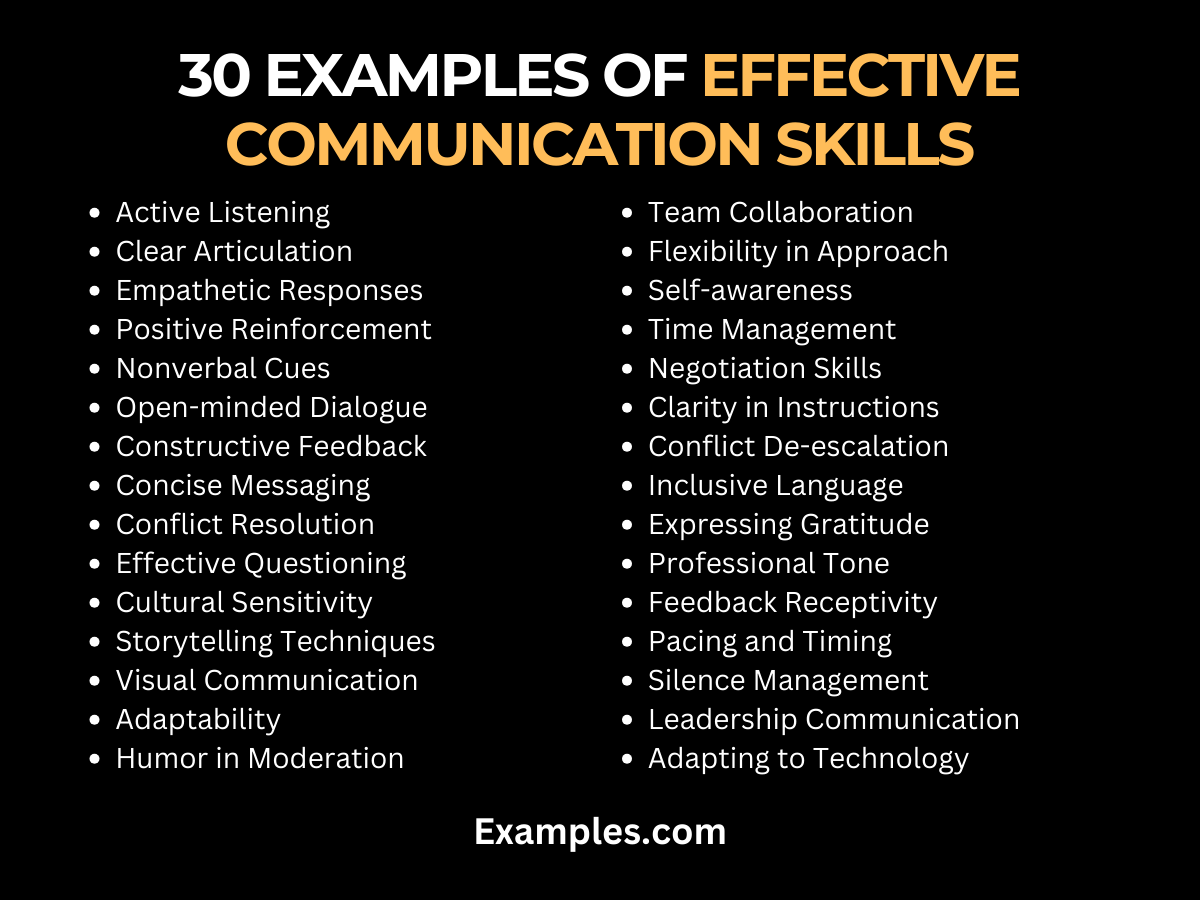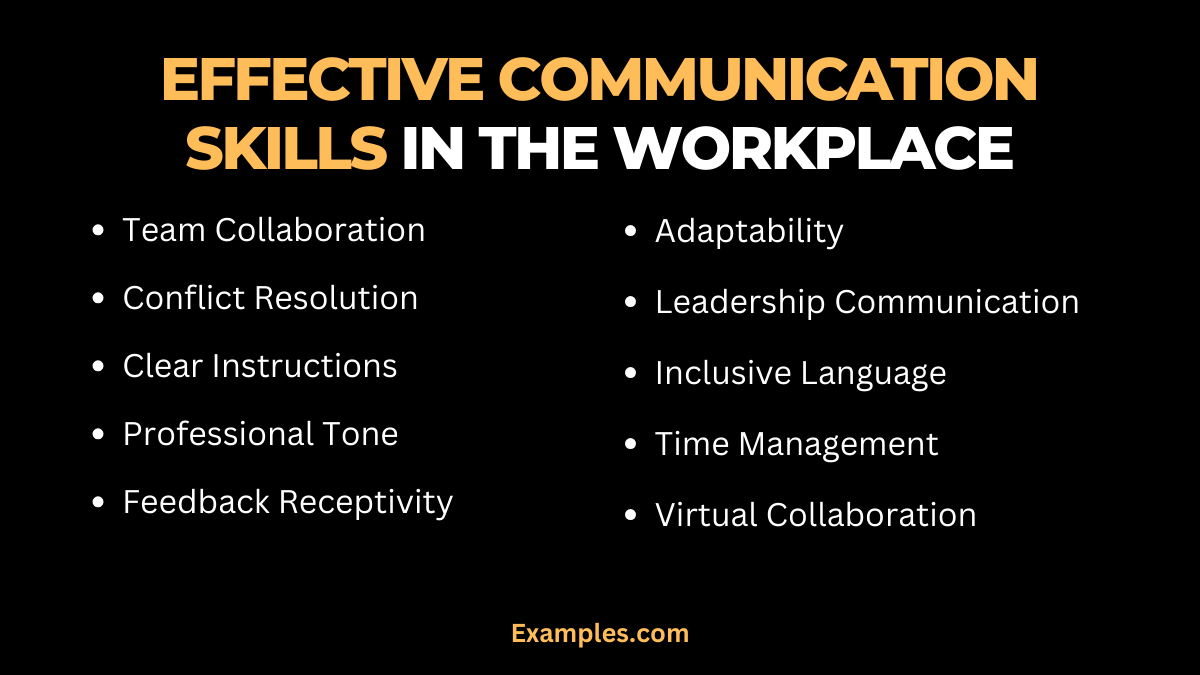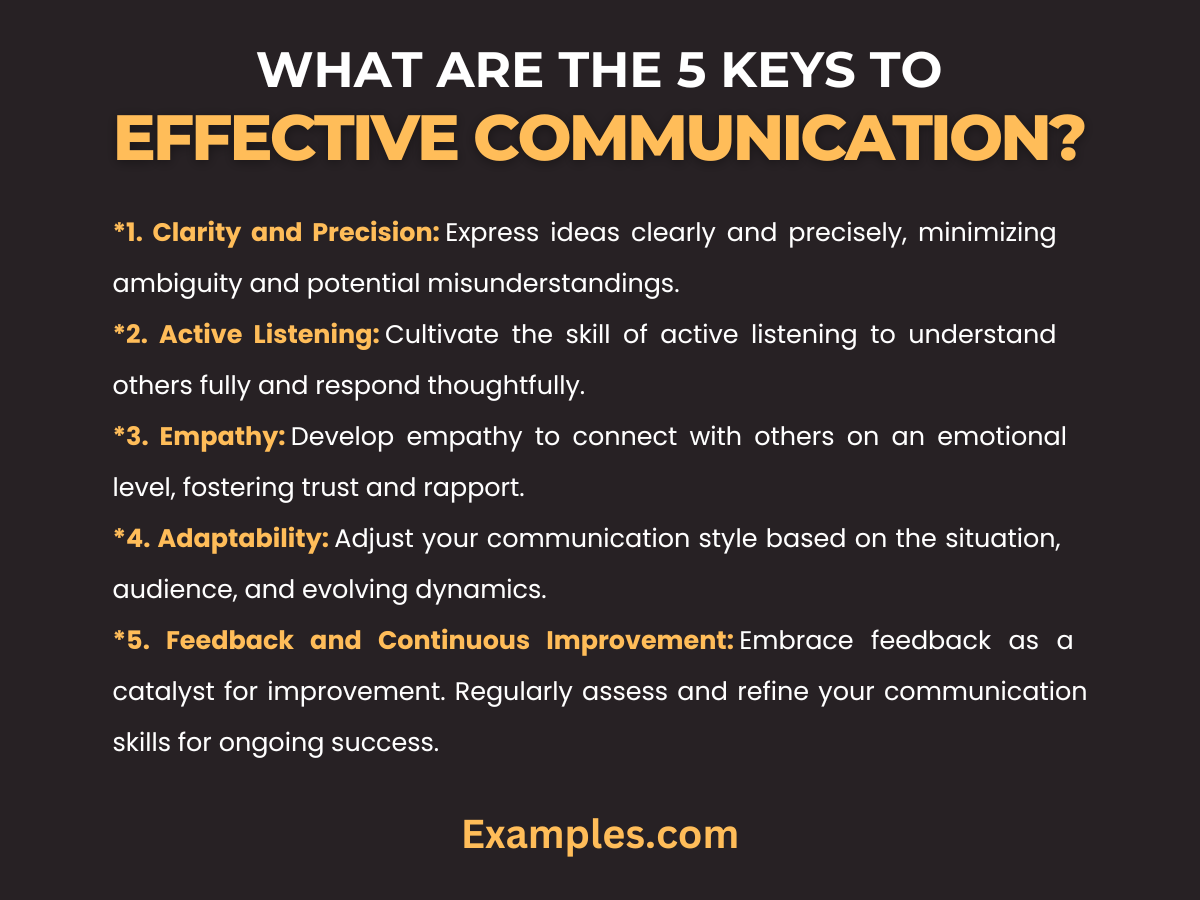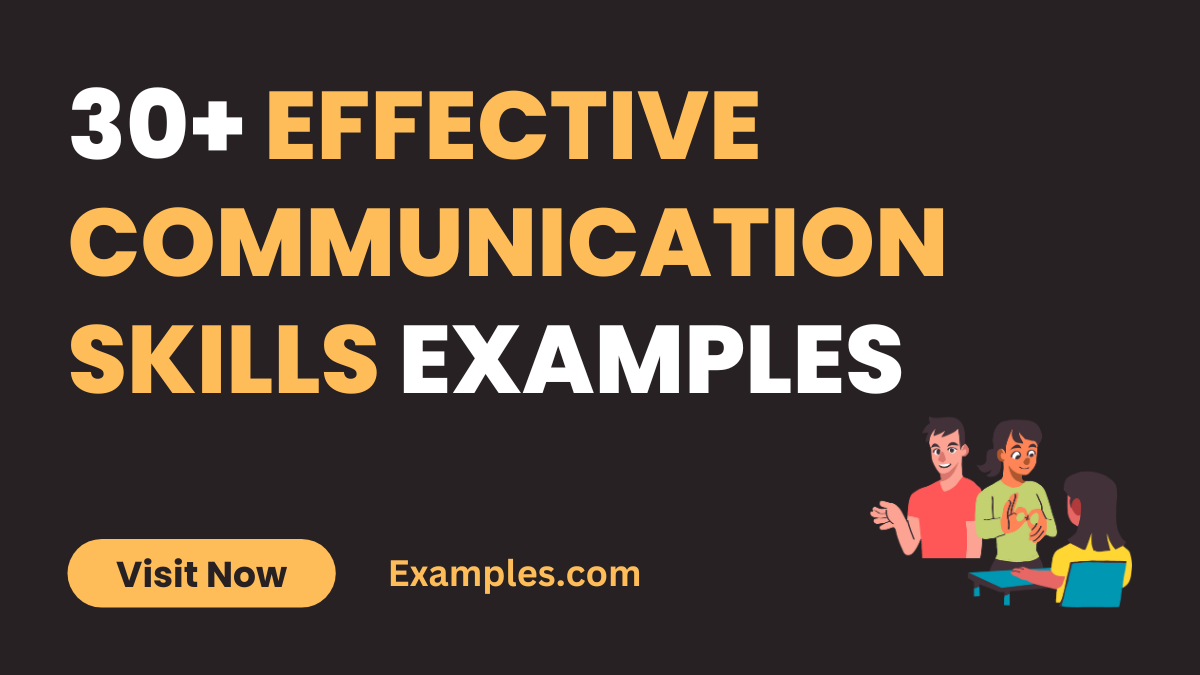29+ Effective Communication Skills Examples
Unlock the keys to successful communication with our complete guide on Effective Communication Skills. In this comprehensive resource, we delve into the intricacies of interpersonal connections, offering valuable insights, strategies, and, most importantly, real-life Communication Examples. Whether you’re navigating the workplace or enhancing personal relationships, our guide equips you with the tools to articulate thoughts effectively. Elevate your communication prowess and explore the dynamic world of Effective Communication Skills through practical examples and actionable advice.
30 Effective Communication Skills Examples
Uncover the art of communication with our compilation of 30 Effective Communication Skills Examples. From workplace scenarios to personal interactions, this resource provides actionable insights for mastering communication. Enhance your verbal and nonverbal skills, understand different communication styles, and conquer challenges with finesse.

- Active Listening: Show genuine interest and respond thoughtfully to others’ ideas.
- Clear Articulation: Express thoughts coherently for better understanding.
- Empathetic Responses: Acknowledge and validate others’ emotions with sensitivity.
- Positive Reinforcement: Encourage and motivate through affirmations.
- Nonverbal Cues: Master body language to convey messages effectively.
- Open-minded Dialogue: Embrace diverse perspectives for constructive discussions.
- Constructive Feedback: Provide helpful criticism to foster improvement.
- Concise Messaging: Deliver information succinctly for better retention.
- Conflict Resolution: Navigate disagreements with diplomacy and understanding.
- Effective Questioning: Pose inquiries that encourage thoughtful responses.
- Cultural Sensitivity: Respect and adapt communication to diverse cultural norms.
- Storytelling Techniques: Engage others through compelling narratives.
- Visual Communication: Utilize visuals for enhanced understanding.
- Adaptability: Adjust communication style to suit different contexts.
- Humour in Moderation: Inject humour to lighten the mood appropriately.
- Team Collaboration: Foster a collaborative spirit through effective communication.
- Flexibility in Approach: Adjust communication methods based on audience needs.
- Self-awareness: Understand personal communication strengths and weaknesses.
- Time Management: Communicate efficiently without unnecessary delays.
- Negotiation Skills: Navigate discussions to reach mutually beneficial agreements.
- Clarity in Instructions: Ensure directives are clear and easy to follow.
- Conflict De-escalation: Calm tense situations through strategic communication.
- Inclusive Language: Use language that promotes diversity and inclusion.
- Expressing Gratitude: Cultivate positive relationships through appreciation.
- Professional Tone: Maintain a respectful and appropriate tone in all communications.
- Feedback Receptivity: Embrace constructive criticism for personal growth.
- Pacing and Timing: Consider the timing and pacing of your communication.
- Silence Management: Know when to pause for emphasis or reflection.
- Leadership Communication: Inspire and guide through effective leadership communication.
- Adapting to Technology: Navigate virtual communication tools with ease.
Effective Communication Skills in the Workplace
Description: Master the nuances of workplace communication with our guide on Effective Communication Skills in the Workplace. Elevate your professional interactions using SEO-friendly tips and real-world examples. From team collaboration to conflict resolution, this resource equips you with the skills to thrive in any workplace scenario.

- Team Collaboration: Foster synergy by encouraging open communication and shared goals.
- Conflict Resolution: Navigate disagreements diplomatically, focusing on finding common ground.
- Clear Instructions: Enhance productivity by delivering concise and understandable directives.
- Professional Tone: Maintain a respectful and appropriate tone in written and verbal communications.
- Feedback Receptivity: Embrace constructive criticism for continuous personal and professional growth.
- Adaptability: Adjust communication methods based on team dynamics and project requirements.
- Leadership Communication: Inspire and guide through clear and motivational communication.
- Inclusive Language: Foster a diverse and inclusive workplace through mindful language use.
- Time Management: Communicate efficiently to ensure timely completion of tasks and projects.
- Virtual Collaboration: Navigate remote work challenges through effective virtual communication.
What are the 5 keys to effective communication?
Communication is multifaceted, and mastering these five keys is paramount for success in any context.

*1. Clarity and Precision: Express ideas clearly and precisely, minimizing ambiguity and potential misunderstandings.
*2. Active Listening: Cultivate the skill of active listening to understand others fully and respond thoughtfully.
*3. Empathy: Develop empathy to connect with others on an emotional level, fostering trust and rapport.
*4. Adaptability: Adjust your communication style based on the situation, audience, and evolving dynamics.
*5. Feedback and Continuous Improvement: Embrace feedback as a catalyst for improvement. Regularly assess and refine your communication skills for ongoing success.
In conclusion, mastering effective communication skills is essential for personal and professional success. As you have explored various aspects and examples of effective communication throughout this guide, remember that the journey to improving these skills is ongoing and dynamic. To further enhance your understanding and application of effective communication, I recommend exploring additional resources.
The American Psychological Association offers valuable insights into the psychological aspects of communication, helping you understand the underlying human behaviours and dynamics that influence interpersonal interactions. Their resources can deepen your understanding of how to communicate more effectively in various contexts.
Additionally, for those seeking to improve communication in professional settings, Harvard Business Publishing provides an in-depth look at effective communication strategies, especially in challenging times. Their materials are particularly beneficial for those in leadership roles or anyone looking to enhance their communication skills in the business world.
Furthermore, Johns Hopkins University Human Resources offers a range of resources and courses focused on developing communication skills. This can be a great way to engage with structured learning and practical exercises to improve your communication abilities.



